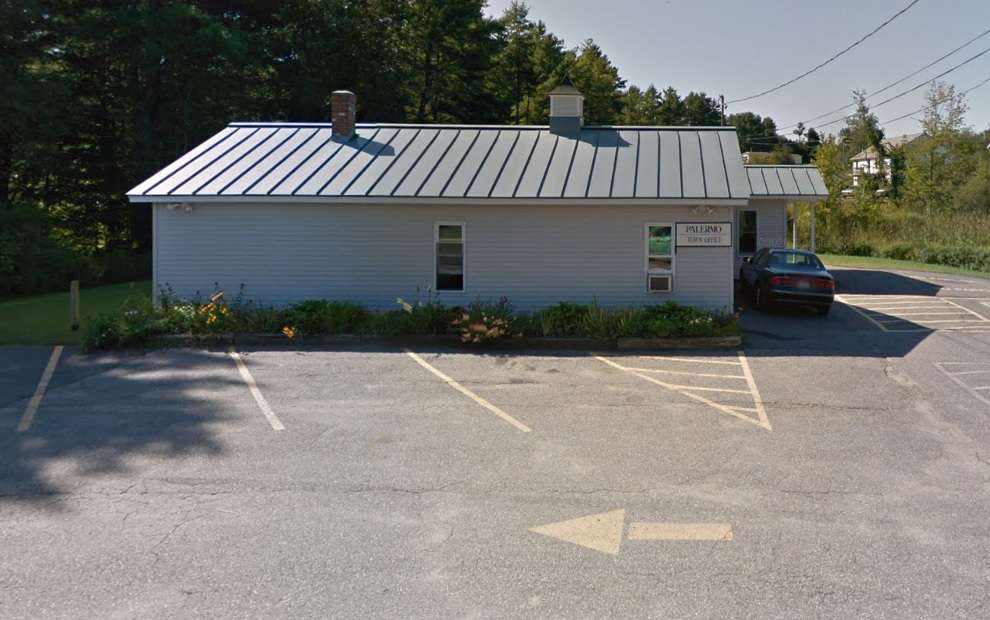China landowners seek moratorium on power line development
 by Mary Grow
by Mary Grow
The Sept. 25 China select board meeting began with a request from two landowners on the section of Parmenter Hill Road known as Moe’s Mountain. They seek a China moratorium on power line development, like those adopted by Albion and Palermo voters in the hope of influencing the proposed LS power line.
Joshua LaVerdiere and Jesse Haskell said one of the potential power line routes would run over the hill, including over Lowell “Moe” Thomas’s grave, destroying a scenic view, damaging the natural environment and reducing the value of their homes and farmland.
Select board members discussed options at length.
A moratorium requires an ordinance adopted by town voters. There is not time to add a question to the Nov. 7 ballot; the next annual vote will be in June 2024.
For a special town meeting, China has a quorum requirement: 100 registered voters are needed to open the meeting.
Select board members can call a meeting on their own initiative; or they can require the interested parties to collect more than 200 petition signatures requesting a meeting, in order to demonstrate public interest and increase the chance of attracting 100 voters.
A draft ordinance could be part of a petition for a meeting; or select board members could present an ordinance to voters. LaVerdiere and Haskell suggested adapting Palermo’s, which was adapted from Albion’s. Daniel Pepice, joining the meeting later in the discussion, provided a copy.
Jeanette Smith, chairman of China’s Thurston Park committee, added that the LS power line might run close to park boundaries.
LS Power is supposed to send letters to potentially affected landowners. Smith has not received one referring to the park. LaVerdiere said he never got one; Pepice estimated 40 percent of potentially affected landowners in the China-Palermo area have not been notified.
Select board members voted unanimously to ask town attorney Amanda Meader to review the Albion/Palermo ordinance. They hope to have her opinion by their first meeting in October, when they will consider whether to call a special town meeting or to require a petition for one.
Smith attended the Sept. 25 select board meeting to talk about repairs in Thurston Park, still recovering from the Dec. 23, 2022, rainstorm that caused major washouts. Two trails were damaged when fallen branches blocked culverts. There were also washouts on the access road in Albion, though Smith said it is usable.
Transfer station returns to stickers Jan. 1
Beginning Jan. 1, 2024, China and Palermo residents will need a sticker on their vehicle to enter the China transfer station. Stickers will cost $2, and should be available at town offices by Nov. 1.
On a 3-2 vote at their Sept. 25 meeting, China select board members adopted the new policy recommended by their transfer station committee (see the Sept. 21 issue of The Town Line, p. 3).
Board chairman Wayne Chadwick and member Blane Casey voted no. Chadwick said his vote was only because he opposes the $2 fee, not because he opposes stickers.
Town Manager Rebecca Hapgood presented a Transfer Station Access Policy that tells China and Palermo residents where to paste the stickers and explains alternatives for temporary admission (for seasonal residents or contractors working for residents, for example).
“We’ll try it for a year, see how it goes,” Hapgood said.
Residents who paid the $10 fee for an additional RFID (radio frequency identification) tag may return the tag to the town office and, with proof of purchase, get a full refund, between Nov. 1, 2023, and May 31, 2024.
Board members postponed action on the one bid for trail work, hoping for more bids. Because the access road is in Albion, they took no action on road work until Town Manager Rebecca Hapgood finds out whether it is legal to spend China money on an Albion road.
Smith explained that the park committee does not recommend access from the south because the abutting landowner objects. When, years ago, the town legally abandoned Yorktown Road, which runs north-south through the park, a public right-of-way was preserved, she said.
Smith shared a video from a group called National Fitness Campaign that helps build outdoor gymnasiums or fitness courts full of exercise equipment. The campaign approached China earlier this year, she said. She does not consider the idea appropriate for Thurston Park.
In other business:
- Board members accepted the lowest of three bids for new gutters on the town office building, $2,457 from Builders Installed Products, of Portland and Hermon.
- They postponed discussion of the proposed storage vault to be added to the town office building and of a new town logo, awaiting more information on both topics.
- They accepted an emailed apology from Tyler Bragdon for any inappropriate statements at the Sept. 11 select board meeting and accepted his offer to pay a $3,500 fine for mistakes in controlling erosion at a Pond Road work site, instead of the $5,000 originally assessed.
- They approved the state’s new general assistance payment levels, after a short public hearing.
Because the next regular select board meeting would fall on Oct. 9, the Indigenous Peoples Day holiday, board members moved it to Tuesday, Oct. 10; and because the planning board meets at 6:30 p.m. Oct. 10, they scheduled the select board meeting for 5 p.m.




 by The Town Line staff
by The Town Line staff



